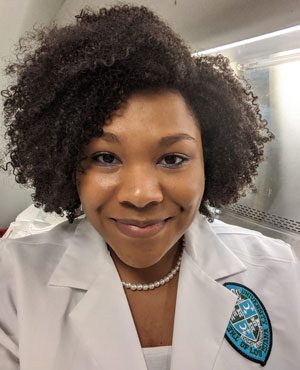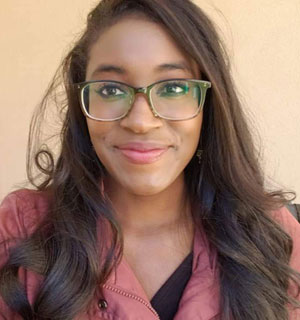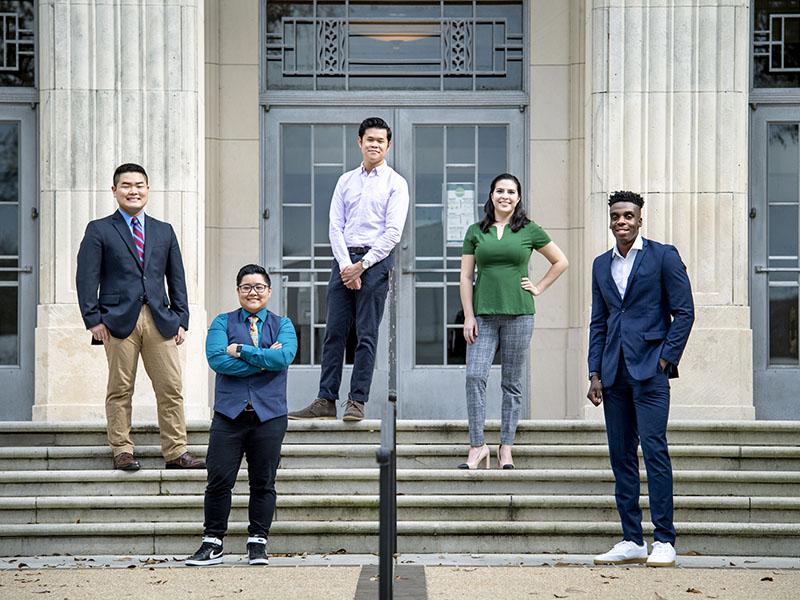Student leaders leverage diverse backgrounds to strengthen graduate, professional experiences
Research shows that college campuses can benefit from diverse student populations, and students often say they prefer to attend a university whose community looks like the world at large.
At Tulane University, the Graduate and Professional Student Association (GAPSA) facilitates interdisciplinary exchanges, provides programming for Tulane’s more than 5,000 graduate students, and represents the concerns and needs of graduate and professional students to the university administration. GAPSA is represented by an Executive Council and nine constituent divisions.
“GAPSA aims to develop and further the scholastic, professional, social and public service interests of all graduate and professional students by promoting an understanding amongst students, faculty, staff and administrators. One of my main roles as GAPSA president is to connect the divisions under the overarching umbrella of GAPSA as well as uplift the work of the divisions’ leadership,” said President Arianne D. Sacramento, a Filipino American who is in her second term as GAPSA president.
This year, GAPSA and its constituent divisions are led by many individuals who identify as diverse.
“This 2020-2021 term has been the first time when I have had the opportunity to work with several BIPOC [Black, Indigenous and People of Color] leaders across GAPSA’s nine constituent divisions. I do not think I can say enough about how working with fellow BIPOC leaders has truly been a welcoming experience,” said Sacramento.
OLUWATOMI “TOMI” AKINGBOLA, MD candidate and GAPSA’s Downtown vice president; co-chair, GAPSA Graduate Diversity Committee
Through work with the Student National Medical Association, Tomi Akingbola and some colleagues have created programs geared toward exposing undergraduate, master’s, and even graduate students to medical school through mentorship and in-person tours, simulations and exhibitions.
“I've had the opportunity to focus on initiatives intentional about creating spaces for historically underrepresented minorities in graduate and professional education. With the recruitment of minorities in these spaces of higher learning, the opportunity to develop an inclusive environment, which is vital for retention, is often missed,” said Akingbola, a Black student.
 Antoinette Bell-Kareem
Antoinette Bell-Kareem
ANTOINETTE BELL-KAREEM, PhD candidate in biomedical sciences and vice president, Biomedical Sciences Student Association (BMSSA); co-chair, GAPSA Graduate Diversity Committee
Antoinette Bell-Kareem has served in student leadership positions for three years and is currently working on a STEM collaboration between Xavier University of Louisiana and Tulane to mentor underrepresented minority undergrads at both institutions who are interested in STEM graduate degrees.
“Diversity in membership allows for a wholeness approach when trying to embody an ‘audacious’ experience here at Tulane,” said Bell-Kareem, a Black student. “If we can include the experiences of those with different backgrounds and opinions, we can cultivate a more accurate impression of who Tulane is for.”
 Angelle Bradford
Angelle Bradford
ANGELLE BRADFORD, doctoral candidate in biomedical sciences and president of BMSSA
BMSSA has looked for collaborative projects within the organization and across cohorts, Angelle Bradford said, such as a COVID-19 vaccine town hall, featuring Black and other medical professionals of color, which was targeted to people outside the profession.
“Currently, I think BMSSA is trying to bridge a lot of gaps – to fully see and hear our students as whole human beings and integral parts of the medical community,” said Bradford, who is Black. “This challenge has allowed me to marry and transfer over skills I have gained from years of advocacy work within the community, and this moment we are in affords me an opportunity to embrace all of our complexities and intersectionalities.”
DANIEL HO, MD candidate and president of the Medical Student Government (MSG)
MSG has among its goals to make quality of life improvements for Tulane medical students, but Daniel Ho said he is also passionate about mentorship and community building. Embracing social advocacy and fostering communications with both junior students and with administration are examples of initiatives that improve the school as a whole.
“Having a diverse student body can serve as a wonderful learning resource. Diversity does not just stop at race or ethnicity, but [also includes] diversity of thought or experiences, which we are lucky to have in the medical school,” added Ho, who is Asian. “This helps provide more opportunities for students to learn about topics they may not have been exposed to in the past, and ultimately helps students approach their patient care in a more informed way.”
RYUHEI “RON” KOSHITA, PhD candidate in physics and president of the Graduate Studies Student Association (GSSA)
Ron Koshita, a Japanese American, has worked to create synergy between the School of Science and Engineering, where he is a student, and the School of Liberal Arts and helped arrange a donation from GSSA to the COVID-19 Student Relief Fund.
“A diverse membership benefits the student body by enlightening all of us as a whole. It can be an amazing thing to witness so many different pieces from a variety of backgrounds coming together to form a community,” Koshita said. “To be able to see my community, as well as the greater Tulane community, come together and power through so many obstacles in such a short amount of time is nothing short of miraculous.”
KARINA MEDEROS, MBA candidate and president, Freeman Graduate Business Council
Karina Mederos, a Cuban American, served as a member of the Freeman Arts Inclusivity Task Force and spearheaded two additional EDI task forces for the business school aimed at reviewing and improving graduate student admissions practices and facilitating diverse faculty hiring. She has also pushed for COVID-19-safe student activities and events across divisions during the semester. Her work, she said, is informed by her openness to new ideas and the value of diverse experiences.
“It was a bit of a culture shock when I arrived [at Tulane] … I was only one of six women in my cohort and one of 12 Hispanics (including single-semester international students) in the graduate Freeman School,” she said. “I think that my unique perspective is what led me to run for leadership positions, which I used to amplify the voices of all of my constituents. I made sure to get feedback and make decisions that could benefit the maximum number of students. I hope to have created a culture of transparency and efficacy.”
On March 4, Sacramento and GAPSA Graduate Diversity Committee co-chairs Bell-Kareem and Akingbola, all of whom study at the School of Medicine (Sacramento is also pursuing graduate degrees in the School of Public Health and Tropical Medicine, as well as the A. B. Freeman School of Business) hosted the GAPSA Guidance Webinar on Equity, Diversity and Inclusion (EDI) to further the opportunities for conversation between graduate/professional students and other EDI leaders around campus. The GAPSA Guidance pilot program is just one example of GAPSA’s efforts to provide programming that speaks to what students want and that will benefit them both in the academic space and as they eventually transition out of it.
“The pulse and purpose of graduate and professional students at TU is central to the cultivation of a total student experience. Our graduate and professional students bring complex lived experiences to our hallowed halls: families, years of experiences and big dreams,” said Kourtney P. Gray, director of New Student and Leadership Programs. “Graduate and professional students choose to continue their education so that they can achieve a goal, and more importantly, they choose Tulane University to be part of a community that is making global change.”

